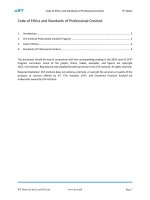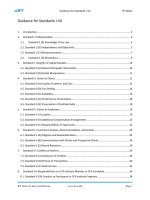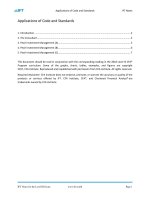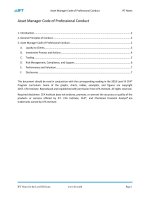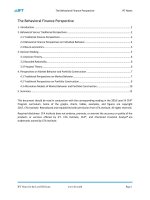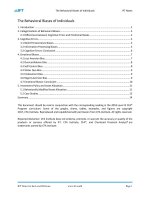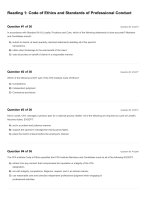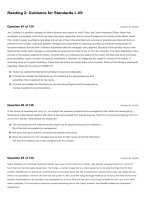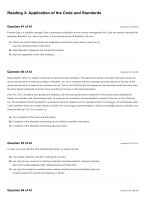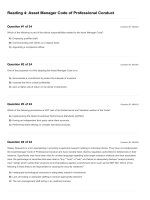CFA 2018 level 3 schweser practice exam CFA 2018 level 3 question bank 29 q
Bạn đang xem bản rút gọn của tài liệu. Xem và tải ngay bản đầy đủ của tài liệu tại đây (65.59 KB, 5 trang )
CFA LEVEL III. PRACTICE QUESTIONS (LOS # 28)
Question 1 - #92609
In 90 days, a firm wishes to borrow $10 million for 180 days. The borrowing rate is LIBOR plus 200
basis points. The current LIBOR is 4%. The firm buys an interest-rate call that matures in 90 days with a
notional principal of $10 million, 180 days in underlying, and a strike rate of 4.1%. The call premium is
$9,000. What is the effective annual rate of the loan if at expiration LIBOR = 4%?
A) 0.0637.
B) 0.0619.
C) 0.0787.
Question 2 - #91698
In delta-hedging, gamma would be important if the price of the underlying asset:
A) had a large move upward only.
B) remained constant.
C) had a large move upward or downward.
Question 3 - #92358
Assume that the current price of a stock is $100. A call option on that stock with an exercise price of $97
costs $7. A call option on the stock with the same expiration and an exercise price of $103 costs $3.
Using these options what is the cost of entering into a long bull spread on this stock?
A) $1.
B) $4.
C) $0.
Question 4 - #93027
A manager would delta hedge a position to:
A) earn extra “dividend” income on a given position.
B) place a floor on the position while leaving the potential for upside risk.
C) earn the risk-free rate.
Question 5 - #92744
Assume that the current price of a stock is $100. A call option on that stock with an exercise price of $97
costs $7. A call option on the stock with the same expiration and an exercise price of $103 costs $3.
Using these options what is the expiration profit of a bear call spread if the stock price is equal to $110?
A) -$6.
B) $2.
C) -$2.
Question 6 - #91625
An option dealer is delta hedging a short call position on a stock. As the stock price increases, in order to
maintain the hedge, the dealer would most likely have to:
A) buy T-bills.
B) sell some the shares of the stock.
C) buy more shares of the stock.
Question 7 - #92538
In 30 days, a firm wishes to borrow $15 million for 90 days. The borrowing rate is LIBOR plus 250
basis points. The current LIBOR is 3.8%. The firm buys an interest-rate call that matures in 30 days with
a notional principal of $15 million, 90 days in underlying, and a strike rate of 4%. The call premium is
$4,000. What is the maximum effective annual rate the firm can anticipate paying?
A) 0.0671.
B) 0.0687.
C) 0.0603.
Question 8 - #92676
What is the expiration payoff of a long straddle, with an exercise price $100, if the underlying stock
price is $125?
A) -$25.
B) $0.
C) $25.
Question 9 - #92914
Assume a stock has a value of $100. Using at the money call and put options on that stock with 0.5 years
to expiration and a constant interest rate of 6 percent, what is the necessary amount that needs to be
invested in a zero coupon risk-free bond in order to synthetically replicate the underlying stock. Which
of the following is closest to the correct answer?
A) $97.04.
B) $103.00.
C) $100.00.
Question 10 - #92926
Linda Morgan is in a training program at a large investment bank. Currently, she is spending three
months at her firm's Derivatives Trading desk. One of the traders, Jason Gover, CFA, asks her to
compare different option trading strategies. Gover would like Morgan to pay particular attention to
strategy costs and their potential payoffs. Morgan is not very comfortable with option models and must
first investigate how to properly price European and American style equity options. Gover has given her
software that provides a variety of analytical information. Morgan has decided to begin her analysis
using two different scenarios to evaluate option behavior. Her scenarios are illustrated in Exhibits 1 and
2. Note that all of the rates and yields are on a continuous compounding basis.
Exhibit 1
Stock Price (S)
$100
Call Strike Price (X) $100
Price
$5.51
Exhibit 2
Stock Price (S)
$100
Put Strike Price (X) $100
Price
$5.68
Gover instructs Morgan to consider using a straddle in which a at-the-money call and put option would
be purchased. Assume all other variables remain identical.
Part 1)
Jason explains to Linda that the volatility of returns of the underlying stock has the most influence over
the price of an option. Following his explanation he queries Linda on how exactly does volatility affect
option values. If the volatility were to increase would the price of the option change?
A) It depends whether the option is a call option or a put option.
B) Yes, the option price will increase.
C) Yes, the option price will decrease.
Part 2)
After computing the maximum loss of the straddle Linda wonders why an investor would want to set up
a straddle. Under what circumstances would an investor want to purchase a straddle? When the investor
expects:
A) Prices to stay close to the exercise price of the options.
B) Prices to increase.
C) Prices to increase or decrease substantially.
Part 3)
Linda returns her attention to the straddle using the information in Exhibits 1 and 2. She computes the
minimum payoff of the straddle at expiration. Which of the following is closest to Linda's answer?
A) -$11.31.
B) -$4.42.
C) $0.00.
Part 4)
Linda now wants to compute the breakeven points for the straddle using the options and underlying
stock in Exhibits 1 and 2. Which of the following are the closest to the breakeven points for the straddle?
A) $95.58, $104.42.
B) $88.81, $111.19.
C) $93.11, $106.89.
Question 11 - #92910
Which of the following best explains put-call parity?
No arbitrage requires that using any three of the four instruments (stock, call, put, bond) the
A)
fourth can be synthetically replicated.
No arbitrage requires that only the underlying stock can be synthetically replicated using at
B) the money call and put options and a zero coupon bond with a face value equal to the strike
price of the options.
C) A stock can be replicated using any call option, put option and bond.
Question 12 - #92852
Assume that the current price of a stock is $100. A call option on that stock with an exercise price of $97
costs $7. A call option on the stock with the same expiration and an exercise price of $103 costs $3.
Using these options what is the profit for a long bull spread if the stock price at expiration of the options
is equal to $110?
A) -$2.
B) $6.
C) $2.
Question 13 - #92415
An investor makes the following transactions in calls on a stock: (1) buys one call with a premium of
$3.50 and exercise price of $20, (2) buys one call with a premium of $1.00 and exercise price of $25,
and (3) sells two calls with a premium of $2.00 each and an exercise price of $22.50. What is (are) the
breakeven price(s)?
A) $21 only.
B) $20.50 and $24.50.
C) $21 and $26.
Question 14 - #93134
An investor purchases a stock for $38 and a put for $0.50 with a strike price of $35. The investor sells a
call for $0.50 with a strike price of $40. What is the maximum profit and loss for this position?
A) maximum profit = $2.00 and maximum loss = -$3.00.
B) infinite profit and maximum loss = -$4.00.
C) maximum profit = $3.00 and maximum loss = -$4.00.
Question 15 - #92150
A firm purchases a collar with floor rate of 3% and a cap rate of 4.4%. The cap and floor have quarterly
settlement and a notional principal of $10 million. The maximum outflow and inflow the buyer can
expect on a given settlement is (assume equal settlement periods):
A) $75,000 and maximum inflow = infinite.
B) $110,000 and maximum inflow = $140,000.
C) $75,000 and maximum inflow = $140,000.
Question 16 - #93111
In 60 days, a bank plans to lend $10 million for 180 days. The lending rate is LIBOR plus 200 basis
points. The current LIBOR is 4.5%. The bank buys an interest-rate put that matures in 60 days with a
notional principal of $10 million, days in underlying of 180 days, and a strike rate of 4.3%. The put
premium is $4,000. What is the effective annual rate of the loan if at expiration LIBOR = 4.1%?
A) 0.0648.
B) 0.0619.
C) 0.0640.
Question 17 - #92847
Dennis Austin works for O’Reilly Capital Management and manages endowments and trusts for large
clients. The fund invests most of its portfolio in S&P 500 stocks, keeping some cash to facilitate
purchases and withdrawals. The fund’s performance has been quite volatile, losing over 20 percent last
year but reporting gains ranging from 5 percent to 35 percent over the previous five years. O’Reilly’s
clients have many needs, goals, and objectives, and Austin is called upon to design investment strategies
for their clients. Austin is convinced that the best way to deliver performance is to, whenever possible,
combine the fund’s stock portfolio with option positions on equity.
Part 1)
Given the following scenario:
Performance to Date: Up 3%
Client Objective: Stay positive
Austin's scenario: Low stock price volatility between now and end of year.
Which is the best option strategy to meet the client's objective?
A) Bull call.
B) Protective put.
C) Long butterfly.
Part 2)
Given the following scenario:
Performance to Date: Up 16%
Client Objective: Earn at least 15%
Austin's scenario: Good chance of large gains or large losses between now and end of year.
Which is the best option strategy to meet the client's objective?
A) Long butterfly.
B) Long straddle.
C) Short straddle.
Part 3)
Given the following scenario:
Performance to Date: Up 16%
Client Objective: Earn at least 15%
Austin's scenario: Good chance of large losses between now and end of year.
Which is the best option strategy to meet the client's objective?
A) Long put options.
B) Short call options.
C) Long call options.
Question 18 - #92288
Suppose that a 1-year cap has a cap rate of 6 percent and a notional amount of $500 million. The
frequency of settlement is quarterly, and the reference rate is 3-month LIBOR. The contract begins on
January 1 and the settlements are on April 1, July 1, October 1, and the following January 1. Given the
indicated LIBOR rates on those dates in the table below, what is the maximum payoff and on what date
did it occur on? (The days in each settlement period have been provided.)
Date
Dt Payoff
Jan. 1 6.15%
Apr. 1 6.15% 90 ?
July 1 6.15% 91 ?
Oct. 1 6.10% 92 ?
Jan. 1 6.10% 92 ?
$189,583 on July
A)
1.
$191,666 on Oct.
B)
1.
$187,500 on
C)
April 1.
Question 19 - #92248
Which of the following is equivalent to a pay-fixed interest rate swap?
A) Buying a cap and selling an interest rate collar.
B) Selling a cap and buying a floor.
C) Buying a cap and selling a floor.
Question 20 - #93141
The buyer of a straddle on a stock is most likely to benefit:
A) if the volatility of the underlying asset’s price decreases.
B) if the volatility of the underlying asset’s price increases.
C) under all conditions because the straddle is guaranteed a risk-free rate of return.
Question 21 - #92662
A stock’s value on the date of option expiration is $88.50. For a call purchased with a $2.20 premium
and an exercise price of $85, what is the breakeven price?
A) $86.30.
B) $88.50.
C) $87.20.
Question 22 - #91692
In delta-hedging a call position, which of the following pairs of conditions would lead to the gamma
effect being the most important? The call is:
A) at-the-money and has a long time until expiration.
B) out-of-the-money and near expiration.
C) at-the-money and near expiration.
Question 23 - #93054
All of the following are conditions that make the second-order gamma effect more important to a
manager delta-hedging an option EXCEPT when the:
A) delta is near zero.
B) option is at-the-money.
C) option is near expiration.
